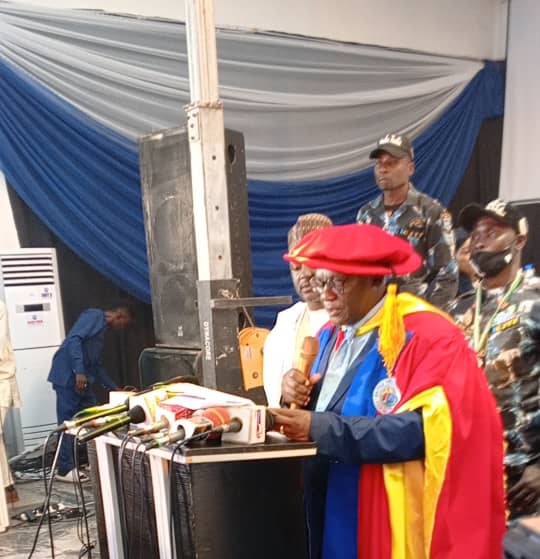
The Director General, Confederation of All Progressives Congress Support Groups (CASG), Engineer Prof. Kailani Muhammad, has disclosed that engineers in Nigeria are facing a lot of challenges in their efforts to contribute meaningfully to the nation’s development, saying that concrete steps must be taken by the government to address the daunting challenges faced by the engineers.
According to him, “It is an embarrassment to the government of the federation, and the citizenry, that after 63 years of independence, our industries are moribund because of the lack of electricity power supply and commitment by Nigerians to the right thing. we must shun corruption”.
Professor Muhammad spoke at his conferment with Professor of Electrical/Electronics Engineering by the British American University, noting that “however, there are daunting challenges faced by the Nigerian engineers, which need to be resolved to enhance performance…”
Enumerating the identified challenges, he said they include; “Insufficient Power Generation: Nigeria faces challenges in generating an adequate quantum of electricity to meet the demands of its growing population and industries, we are battling to reach four thousand megawatts instead of ten thousand megawatts for efficiency.
“Transmission and Distribution Losses: The power infrastructure experiences significant losses during transmission and distribution due to outdated equipment, theft, and technical issues such as expansion of power lines, archaic substations, inadequate transformers, etc.
“Funding and Investment Constraints: Limited funding and investment in the power sector, hinder the development and maintenance of power infrastructure and technologies.
“Fuel Supply Issues: Many power plants in Nigeria rely on gas or oil, and interruptions in fuel supply contribute to inconsistent power generation and failure. Theft and pipeline vandalism should be checked, monitored and curtailed for adequate fuel supply.
“Lack of Maintenance: Inadequate maintenance of power facilities leads to frequent breakdowns and inefficiencies in the power generation, transmission, and distribution processes. Nigerians don’t believe in maintenance, replacing faulty spare parts instead of repairs,” he disclosed.
Speaking further, he maintained that, “In an effort to address these issues, the solutions to make the Power Sector improve significantly should be; Investment in Renewable Energy: Increasing investments in renewable energy sources, such as solar and wind, to diversify the energy mix and provide sustainable alternatives.
“Infrastructure Upgrade: Upgrading and modernizing the power infrastructure, including transmission and distribution systems, to mitigate against avoidable losses and improve efficiency.
“Public-Private Partnerships (PPPs): Public- Private Partnership must be encouraged to attract additional funding, expertise, and efficiency in managing power facilities and telecommunications.
“Improved Fuel Supply Chain: Addressing issues related to the supply of fuel for power generation, including exploration and production, transportation, and storage, can enhance the reliability of power plants.
“Energy Efficiency Programs: Implementing energy efficiency initiatives in industries and households can help manage demand and reduce overall pressure on the power grid.
“Policy Reforms: Implementing and enforcing policies that promote transparency, accountability, and efficiency in the power sector can attract investments and improve overall governance.
“Community Engagement and Education: Involving communities in energy conservation practices and educating the public about the importance of responsible energy consumption can contribute to a more sustainable energy future. Again, the use of community policing against vandalism of power equipment, will minimize losses and stabilize energy supply.
“These requirements though, are capital intensive, require a comprehensive and coordinated effort, involving government agencies, private sector stakeholders, and the general public.
“It would seem that the government made the wrong choices, when it allocated licenses to institutions that have no capacity to effectively manage the facilities. For example; the award of licenses to marketers to construct modular refineries over the years. They couldn’t do it and only using the license for foreign exchange.
“There were rumours of terminating the contract at the tail end of former president Muhammadu Buhari on the DisCos for not delivering on their mandate, but it fizzled out.
“We advise the federal government to take the bull by the horns and sort out the problems associated with the Nigerian power sector once and for all”, he said.
READ ALSO FROM NIGERIAN TRIBUNE
WATCH TOP VIDEOS FROM NIGERIAN TRIBUNE TV
- Let’s Talk About SELF-AWARENESS
- Is Your Confidence Mistaken for Pride? Let’s talk about it
- Is Etiquette About Perfection…Or Just Not Being Rude?
- Top Psychologist Reveal 3 Signs You’re Struggling With Imposter Syndrome
- Do You Pick Up Work-Related Calls at Midnight or Never? Let’s Talk About Boundaries






